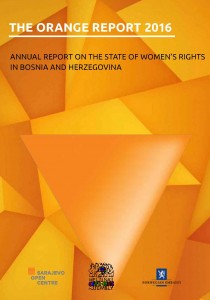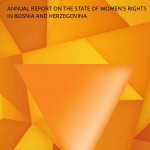The Orange Report 2016: PRIORITY MEASURES TO BE UNDERTAKEN
 Improving the legal framework for gender equality in the Executive and in the Legislature
Improving the legal framework for gender equality in the Executive and in the Legislature
The existing legal provisions – the gender quota for at least 40% of the less represented gender on the electoral lists (Article 4.19, Electoral Law BiH), the general and sanction-free provision on equal participation of women and men in the Government (Article 20 Gender Equality Law) have garnered progress, but they do not have the potential to ensure a significant increase in the number of elected women. For this reason alternative measures are necessary. In order to achieve equal participation of women and men at least two changes are needed.
The first change refers to the Electoral Law BiH and it would introduce a gender quota of 50% (the so-called zipper system)[i] as well as additional measures to give mandates to members of the less-represented gender (e.g. through the award of mandates from the compensatory electoral lists).
The second change addresses amendments of laws that regulate the election of cantonal and entity governments and the Council of Ministers BiH. These laws need to be harmonized with Article 20 of the gender Equality Law BiH and they need to include a provision according to which the future governments could not be confirmed unless the minimum representation of 40% of both men and women is fulfilled.
Strengthening capacities and mechanisms and implementing programs for gender equality in cantons
The existing legal, political and institutional framework has ensured improvement in terms of gender equality in those areas that fall under the State and Entity jurisdiction. Unfortunately, in the Federation of BiH cantons have often been left behind, despite the constitutional guarantee of their jurisdiction over many of the key issues of importance for men and women in the Constitution of the Federation of BiH. Therefore, it is not surprising that there has been little progress in areas of employment, healthcare or education, because cantons do not have the adequate bodies/offices, nor public policies (strategies or action plans). For an example, the Gender Action Plan is not systematically implemented on cantonal level, because the Gender Centre of the Federation of BiH does not have the capacity to focus on this. On the other hand, unless public policies are developed and bodies for gender equality formed, significant progress in these areas cannot be expected.
It is essential to strengthen cantonal capacities in order to enable the cantons to work on improving gender equality in areas which are within their jurisdiction. Cantons need to establish offices or bodies within the government, to work alongside the gender equality commissions, which operate within the cantonal assemblies on the development of public policy for gender equality and its implementation. Naming a contact person in the cantonal governments is essential, as it would be their task to maintain open lines of communication between the canton and the Gender Centre of the Federation, therefore ensuring good gender equality programs.
End discrimination in access to maternity/paternity leave in Federation of BiH
Multiple analyses in 2015, including the last special report by the Institution of the Ombudsman for Human Rights in BiH,[ii] confirmed that the issue of discrimination of new mothers in the Federation of BiH is persistent. Maternity leave is regulated differently and child support varies according to women’s employment status, employment sector and the canton in which she resides. Some cantons do not have a fund for maternity benefits at all, which is particularly disconcerting. In the majority of other cantons the benefits are often behind schedule.
In order to adequately resolve this the best solution would be to transfer jurisdiction over maternity benefits from cantons to the Federation of BiH and to pass a new law establishing a Fund for Maternity Benefits in order for all expectant and new mothers to have the same rights regardless of the sector in which they work and the canton in which they live. As a part of this reform it is also necessary to regulate the rights of unemployed women.[iii]
Show commitment to implementation of the Istanbul Convention
Statistics in the crime reports and the grim financial situation of safe houses in the Federation of BiH are just some of the indicators that confirm that all levels of government in BiH have a long road ahead, in terms of combating gender-based violence. Recent political support, which manifested itself in the speedy ratification of the Istanbul Convention in 2013 and the adoption and implementation of the Framework Strategy in July 2015, needs to be transformed into practical work in order to advance the institutional mechanisms for tackling domestic and gender-based violence, at all levels of government. Cooperation with the civil society organizations is a necessary part of this process, especially since women’s organizations were the ones who removed domestic violence from the purview of the “private” and into the public domain – on the parliamentary and government agenda. It is therefore good news that in August 2015 the Gender Equality Agency has signed a Memorandum of Understanding with the Safe Network BIH,[iv] a coalition of civil society organizations – including all nine safe houses in BiH – which are working on combating gender based violence. In addition to this, the Gender Equality Agency, through the proxy of the Ministry of Human Rights and Refugees, established cooperation with the USAID mission in BiH, in October 2015. As a result of this cooperation the Agency will, as of 2016, supervise a program for implementation of the Istanbul convention worth 750,000 USD.[v]
You can find the Orange Report 2016 – Annual Report on the State of Women’s Rights in BiH following this link.
—
[i] Sarajevo Open Centre submitted this initiative in January 2016 to the Parliamentary Assembly of BiH:
[ii] Special Report available at: http://www.ombudsmen.gov.ba/documents/obmudsmen_doc2015102111102085bos.pdf
[iii] The initiative „Građanke za ustavne promjene“ (NGO coalition) is proposing to include the right to healthcare in the Rights Catalog of the BiH Institution (Art.II (3)) including maternity benefits and treatment of infertility.
[iv] ARS BiH news:
[v] ARS BiH news:
Narandžasti izvještaj 2016Orange Reportwomen's rightsPotpisan Memorandum o grant sredstvima između USAID-a i Ministarstva za ljudska prava i izbjeglice
 The Orange Report 2016 – Annual Report on the State of Women’s Rights in Bosnia and Herzegovina
The Orange Report 2016 – Annual Report on the State of Women’s Rights in Bosnia and Herzegovina